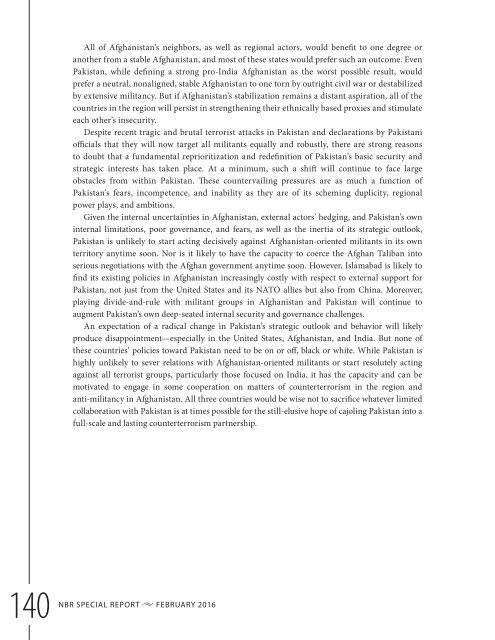pakistan’s
SR55_Mapping_Pakistan_February2016
SR55_Mapping_Pakistan_February2016
You also want an ePaper? Increase the reach of your titles
YUMPU automatically turns print PDFs into web optimized ePapers that Google loves.
All of Afghanistan’s neighbors, as well as regional actors, would benefit to one degree or<br />
another from a stable Afghanistan, and most of these states would prefer such an outcome. Even<br />
Pakistan, while defining a strong pro-India Afghanistan as the worst possible result, would<br />
prefer a neutral, nonaligned, stable Afghanistan to one torn by outright civil war or destabilized<br />
by extensive militancy. But if Afghanistan’s stabilization remains a distant aspiration, all of the<br />
countries in the region will persist in strengthening their ethnically based proxies and stimulate<br />
each other’s insecurity.<br />
Despite recent tragic and brutal terrorist attacks in Pakistan and declarations by Pakistani<br />
officials that they will now target all militants equally and robustly, there are strong reasons<br />
to doubt that a fundamental reprioritization and redefinition of Pakistan’s basic security and<br />
strategic interests has taken place. At a minimum, such a shit will continue to face large<br />
obstacles from within Pakistan. These countervailing pressures are as much a function of<br />
Pakistan’s fears, incompetence, and inability as they are of its scheming duplicity, regional<br />
power plays, and ambitions.<br />
Given the internal uncertainties in Afghanistan, external actors’ hedging, and Pakistan’s own<br />
internal limitations, poor governance, and fears, as well as the inertia of its strategic outlook,<br />
Pakistan is unlikely to start acting decisively against Afghanistan-oriented militants in its own<br />
territory anytime soon. Nor is it likely to have the capacity to coerce the Afghan Taliban into<br />
serious negotiations with the Afghan government anytime soon. However, Islamabad is likely to<br />
find its existing policies in Afghanistan increasingly costly with respect to external support for<br />
Pakistan, not just from the United States and its NATO allies but also from China. Moreover,<br />
playing divide-and-rule with militant groups in Afghanistan and Pakistan will continue to<br />
augment Pakistan’s own deep-seated internal security and governance challenges.<br />
An expectation of a radical change in Pakistan’s strategic outlook and behavior will likely<br />
produce disappointment—especially in the United States, Afghanistan, and India. But none of<br />
these countries’ policies toward Pakistan need to be on or off, black or white. While Pakistan is<br />
highly unlikely to sever relations with Afghanistan-oriented militants or start resolutely acting<br />
against all terrorist groups, particularly those focused on India, it has the capacity and can be<br />
motivated to engage in some cooperation on matters of counterterrorism in the region and<br />
anti-militancy in Afghanistan. All three countries would be wise not to sacrifice whatever limited<br />
collaboration with Pakistan is at times possible for the still-elusive hope of cajoling Pakistan into a<br />
full-scale and lasting counterterrorism partnership.<br />
140<br />
NBR<br />
SPECIAL REPORT u FEBRUARY 2016


